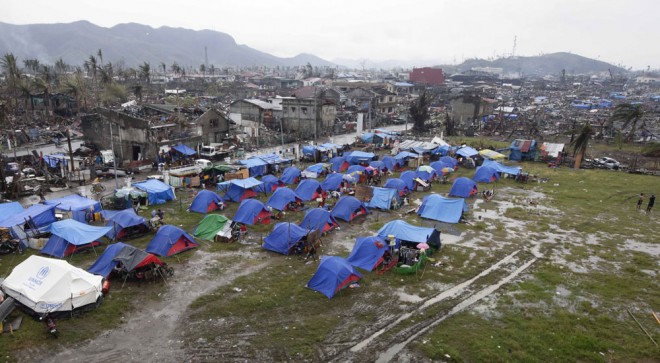Informal supply chain helps ‘Yolanda’ victims cope

A tent city for Supertyphoon “Yolanda” survivors emerges Saturday, Nov. 23, 2013, at Tacloban City. Supplementing the quickening relief effort to help survivors of Yolanda is an informal—and sometimes underground—supply chain that is helping people put food on the table. AP
TACLOBAN CITY, Philippines—Supplementing the quickening relief effort to help survivors of Supertyphoon “Yolanda” is an informal—and sometimes underground—supply chain that is helping people put food on the table.
Families from as far away as Manila and Mindanao endure long journeys by air, sea and land to bring food, tents, medicine and other goods to affected relatives.
Friends stay with friends and communities share whatever they have, especially if a neighbor has babies, children or elderly members.
Marife Sumapig and her family have received only one food pack since Yolanda, one of the strongest storms ever to hit land, smashed through the central Philippines on Nov. 8, leaving at last count more than 5,000 dead and millions homeless.
The aid package contained four kilos of rice, some cup noodles and two tins of sardines—barely enough for a few days.
Article continues after this advertisement“Despite receiving help only once, we have not gone hungry so far. There seems to be food on the table every day,” Sumapig told Agence France-Presse from her damaged house in this city, one of the hardest-hit places.
Article continues after this advertisement“Today I ate lunch at my sister’s place. Yesterday, my husband bought some vegetables in another town, so we’re tiding it over,” she said.
Sumapig, her husband and their eight-year-old son have taken up the offer of a friend to stay at his house, one of the few in the city that is still habitable.
Help is coming from Manila, where their 17-year-old daughter Ameel is studying. “When her classmates learned that she was from Tacloban, they pooled their resources and gave her some money and groceries,” Sumapig said.
In the town of Burawin, around 40 kilometers from Tacloban, three men were chewing on dried squid as they sipped gin and colas, courtesy of a relative who had travelled from General Santos City in Mindanao to bring the goodies.
“It took me about 30 hours traveling by ship and bus to come here,” said Juanito Nario, 47.
He told AFP he brought the squid, rice, noodles, canned goods, medicine, soap and matches to his sister.
A less talked-about, but no less important side of the food chain in Tacloban and nearby towns, say residents, are items taken from two department stores in the first few days after the typhoon.
At the time there were no police on the streets and chaos reigned, resulting in a free-for-all as hungry people helped themselves to groceries and other merchandise.
A Tacloban entrepreneur, who did not want to be named because of the sensitivity of the issue, said his family had been receiving food from scavengers they had sheltered in the storm’s immediate aftermath.
“I was surprised because they would give us branded sausages and hot dogs which I knew came from a certain mall,” said the businessman, apparently referring to Robinsons supermarket, which was raided by mobs for four days before out-of-town police were flown in to impose order.
“We knew they were looted groceries but what could we do? We needed food,” he said.